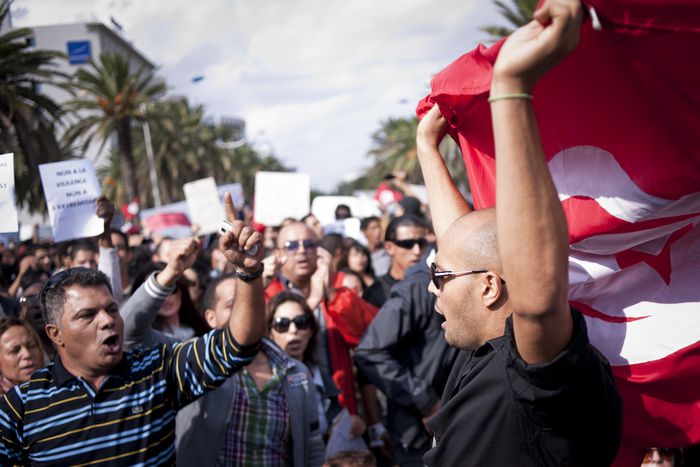
Tunisia elections: nine months after Arab Spring (15 images)
Published on
Translation by:
Hannah MosfordIt’s almost become a saying: there’s a big difference between an instinct and a project. The instinct came once upon a Spring when an entire country reacted against an erratic and outmoded system. The project comes on 23 October, nine months after Ben Ali was dethroned, when Tunisia's ten million people will undergo the first of their democratic tests in electing a constitutional assembly. Italo-Argentine photographer Ezequiel Scagnetti maps the ever palpable tension (All images © ezequiel-scagnetti.photoshelter.com/index)

Cartoonist Nidal Garyani draws to encourage people to vote. During the Arab Spring revolution, which began with protests in December and saw the country's dictator Zine El Abidine Ben Ali ousted on 14 January, a group of artists was invited by the independent high authority for the elections (ISIE) to work on a wall dedicated to promoting the elections on 23 October. Read 'Tunisia: street fights and cyber war against dictator' to see how this story began (Image: ©Ezequiel Scagnetti)

In the weeks ahead of the elections there has been a feeling of restlessness, like the demonstration against the television channel Nessma which was attacked by Salafists after broadcasting the film Persepolis. Read 'Graffiti, books flood post-revolution Tunisia' on cafebabel.com (Image: © Ezequiel Scagnetti)

'Excuse me, it looks like there's a demonstration against the islamists,' I innocently ask, sandwich in my left hand and my two cameras over my shoulder. 'It's not a demonstration against that movement; we are here for peace, freedom of expression, and for a secular state,' Mohammed Slim, a 22-year-old politics student, corrects me (Image: ©Ezequiel Scagnetti)

Islamists are expected to win in the 23 October elections. Allah Hu Akbar! cries a supporter of Ennhadha, the islamist party, in the middle of the crowd who cannot believe their eyes. A second later, he is on the ground in the process of killing himself. Two seconds after that plain-clothes policemen arrive and, with the more tolerant demonstrators, capture him and leave him in the care of Tunis' police who take him a long way away. 'In Tunisia today, you have to choose your side, it's a war here. It's us or them,' one girl tells me. She can't be more than twenty, with her video camera, cigarette in mouth and left fist raised high (Image: ©Ezequiel Scagnetti)

Monia Ayari, a member of the democratic modernist pole (PDM), distributes flyers and declarations of faith from her newly-created party' over 60 are standing for 218 seats in the constitutional assembly (Image: ©Ezequiel Scagnetti)

On 16 October, a week before the elections, a march took place in the streets of Tunis alongside the organisation of a dress rehearsal for the elections which the authorities made sure went smoothly. One of the key issues at the polls is freedom of expression (Image: ©Ezequiel Scagnetti)

The issue of helping. The major dress rehearsal organised for 16 October ensures the democratic exercise runs smoothly. In addition to the hundreds of volunteers involved in the organisation of this run-through, the police and army kept a close eye on the development of this practice ballot (Image: © Ezequiel Scagnetti)

Even for a practice vote, there is a big citizen turnout (Image: ©Ezequiel Scagnetti)

Influences have well and truly changed. Since the Arab Spring, signs usually show the face of Che Guevara rather than that of former dictator Ben Ali. This is logical, but this image really shows the demonstrators' wish to establish secularism in their country (Image: ©Ezequiel Scagnetti)

Consider this anecdote. A taxi driver from Brussels would like to go back home. Since the inauguration of Ben Ali in 1987, he has been chased by him, to an extent. Now that the Trabelsi family are no longer here, the way is clear. 'In the past, whatever matter you wanted to organise, you had to come to an arrangement with the Trabelsi family. Now it's a free market, really, but you have to be careful, no one is going to invest a single dinar before a government is formed. Everything depends on the constituant assembly elections. If the islamists win...' (Image: ©Ezequiel Scagnetti)

Many women were present in the procession. Was this proof of a certain open-mindedness? (Image: ©Ezequiel Scagnetti)

Notice boards with electoral posters adorn all the walls in Tunis. The elections on 23 October represent a true democratic standard, so much so that they also offer a previously undreamed-of opportunity for some people to launch themselves into politics. To date, more than 100 parties have registered (Image: ©Ezequiel Scagnetti)

Many of the questions outlined for the past nine months have still not been answered. Even if the moment leads to euphoria, many will wonder about the post-election period. Because people are already looking towards 2012. It is the year for which many key figures are saving themselves for the presidential elections (Image: ©Ezequiel Scagnetti)

(Image: ©Ezequiel Scagnetti)

To avoid fraud, voters dip their fingers into a bottle of indelible ink. This method, known as 'democratic transparency', has already been used in the legislative elections in Afghanistan on 18 September 2011 (Image: ©Ezequiel Scagnetti)
Translated from Les élections tunisiennes : après 9 mois, l’accouchement



